|
|
|
Sort Order |
|
|
|
Items / Page
|
|
|
|
|
|
|
| Srl | Item |
| 1 |
ID:
022410
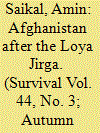

|
|
|
|
|
| Publication |
2002.
|
| Description |
47-56
|
| Summary/Abstract |
Dramatic change came to Afghanistan not because the world community suddenly decided that the Afghans were a people worth saving from the regime that was tormenting them, but because the Taliban's allies finally engaged in activities that directly harmed the United States. The 11 September attacks, ugly and deplorable as they were, brought an answer to the Afghans' prayers. At last, the only power capable of moving decisively against the Taliban and its supporters was forced to act. In the process, it had no choice but to engage the region more widely and deeply than it could have contemplated on 10 September. But if American policymakers expect to pull back from this engagement, limiting the US role to that of an ‘over-the-horizon’ actor, they should also expect further conflict and instability. The best hope for long-term peace depends on the United States engaging Afghanistan and its neighbours in the difficult task of nation-building.
|
|
|
|
|
|
|
|
|
|
|
|
|
|
|
|
| 2 |
ID:
065646
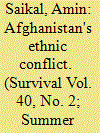

|
|
|
|
|
| Publication |
1998.
|
| Description |
p.114-126
|
|
|
|
|
|
|
|
|
|
|
|
|
|
|
|
| 3 |
ID:
130865
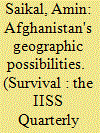

|
|
|
|
|
| Publication |
2014.
|
| Summary/Abstract |
Afghanistan's geostrategic potential is hampered by domestic weakness, regional tensions and major-power competition. Historically, Afghanistan's position at the junction between Asia and Europe has not only made it susceptible to outside invasions and influence, but also rendered it an important conduit for cross-continental interactions. The Greco-Bactrian (250-150 BCE), Kushan (30-375 AD) and Sassanid (224-651 AD) empires derived much of their wealth from the Silk Road, a series of interlinked trading networks criss-crossing the Eurasian land mass and centred around what is now known as Afghanistan. These routes served as the main arteries of east-west trade and transportation, until the disintegration of the Mongol Empire in 1368 AD effectively dismantled the network.
|
|
|
|
|
|
|
|
|
|
|
|
|
|
|
|
| 4 |
ID:
069184
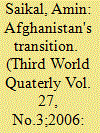

|
|
|
| 5 |
ID:
107229
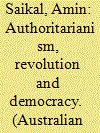

|
|
|
|
|
| Publication |
2011.
|
| Summary/Abstract |
The pro-democracy Arab popular uprisings have been spontaneous, but perhaps not all that unpredictable. They have come against the backdrop of a growing gulf between the rulers and the ruled, political repression, social and economic inequalities, demographic changes, unemployment and foreign policy debacles. Although the uprisings began in Tunisia, it is the case of Egypt that illustrates the situation more compellingly and the impact that it has had on the rest of the Arab world. It is not clear at this stage what will be the ultimate outcome. But what can be said with certainty is that the Arab peoples have set out on a long journey in pursuit of genuine self-determination. The journey will be arduous and unsettling for the Arabs and outsiders, but this has to be treated as part of a transition from a dictatorial past to a politically pluralist future.
|
|
|
|
|
|
|
|
|
|
|
|
|
|
|
|
| 6 |
ID:
000986
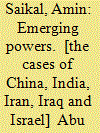

|
|
|
|
|
| Publication |
Abu Dhabi, The Emirates Center for Strategic Studies and Research, 1997.
|
| Description |
50p.
|
| Series |
Occasional paper,12
|
|
|
|
|
|
|
|
|
|
|
|
Copies: C:1/I:0,R:0,Q:0
Circulation
| Accession# | Call# | Current Location | Status | Policy | Location |
| 040497 | 327.1/SAI 040497 | Main | On Shelf | General | |
|
|
|
|
| 7 |
ID:
003117
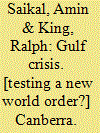

|
|
|
|
|
| Publication |
Canberra, Australian National Univ., 1991.
|
| Description |
10p.pbk
|
| Series |
Strategic Defence Studies Centre; no. 233
|
| Standard Number |
0731512049
|
|
|
|
|
|
|
|
|
|
|
|
Copies: C:1/I:0,R:0,Q:0
Circulation
| Accession# | Call# | Current Location | Status | Policy | Location |
| 033131 | 956.7043/SAI 033131 | Main | On Shelf | General | |
|
|
|
|
| 8 |
ID:
069690
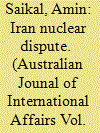

|
|
|
| 9 |
ID:
166288
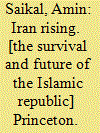

|
|
|
|
|
| Publication |
Princeton, Princeton University Press, 2019.
|
| Description |
xvi, 326p.hbk
|
| Standard Number |
9780691175478
|
|
|
|
|
|
|
|
|
|
|
|
Copies: C:1/I:0,R:0,Q:0
Circulation
| Accession# | Call# | Current Location | Status | Policy | Location |
| 059655 | 950/SAI 059655 | Main | On Shelf | General | |
|
|
|
|
| 10 |
ID:
079846
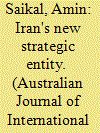

|
|
|
|
|
| Publication |
2007.
|
| Summary/Abstract |
This article focuses on the two political factions in Iran, the Jihadi (traditionalist combative) and the Ijithadi (creatively interpretive) and their competition and accommodation since the Revolution. The author argues that US-policy and developments in the region have favoured the Jihadis and enabled President Ahmadinejad to act more intransigently and assertively than would otherwise been the case. At a time of profound shift in the sectarian and strategic balance in the region, the challenge for the US and its allies is to widen the arena for Ijithadis within Iranian politics.
|
|
|
|
|
|
|
|
|
|
|
|
|
|
|
|
| 11 |
ID:
057637
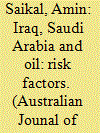

|
|
|
| 12 |
ID:
054284
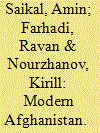

|
|
|
|
|
| Publication |
London, I B Tauris, 2004.
|
| Description |
ix, 341p.hbk
|
| Standard Number |
1850434379
|
|
|
|
|
|
|
|
|
|
|
|
Copies: C:1/I:0,R:0,Q:0
Circulation
| Accession# | Call# | Current Location | Status | Policy | Location |
| 048772 | 958.1046/SAI 048772 | Main | On Shelf | General | |
|
|
|
|
| 13 |
ID:
033303
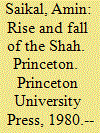

|
|
|
|
|
| Publication |
Princeton, Princeton University Press, 1980.
|
| Description |
vi, 279p.: ill., mapshbk
|
|
|
|
|
|
|
|
|
|
|
|
Copies: C:1/I:0,R:0,Q:0
Circulation
| Accession# | Call# | Current Location | Status | Policy | Location |
| 019113 | 955.053/SAI 019113 | Main | On Shelf | General | |
|
|
|
|
| 14 |
ID:
091301
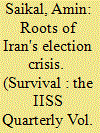

|
|
|
|
|
| Publication |
2009.
|
| Summary/Abstract |
The Iranian leadership's handling of the dispute over the June 2009 presidential election not only bitterly alienated a sizeable proportion of the population; it also deeply split the ruling clerics. The government has lost the support of many ranking Islamist figures, whose continued backing is necessary to maintain its coherence and effectiveness, and its legitimacy has been eroded. If it fails to modify its authoritarian Islamist mindset and power structure to claw back some, if not all, of its lost clerical and public support, the scene is set for a greater popular backlash in the long run. The current turmoil, ostensibly sparked by the election results, stems from a confluence of factors, including growing public discontent with the regime's theocratic behaviour, economic mismanagement and foreign-policy embarrassments, especially since Ahmadinejad became president in 2005. These are symptomatic, however, of deeper structural problems in the nature of the Islamic government that has evolved in Iran.
|
|
|
|
|
|
|
|
|
|
|
|
|
|
|
|
| 15 |
ID:
068452
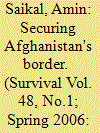

|
|
|
| 16 |
ID:
113107
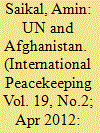

|
|
|
|
|
| Publication |
2012.
|
| Summary/Abstract |
Following more than a decade of NATO's intervention in Afghanistan, it is often argued that the UN, alongside its international partners and the Afghan government, has failed to facilitate good governance and a stable democratic political order. In charting the evolving UN role in 'democratizing' Afghanistan, this article analyses why this is so. The UN Assistance Mission in Afghanistan (UNAMA), facing considerable historical and institutional constraints, has had neither the will nor the capacity to implement its ambitious democratization mandate. Instead of aiming for a system of governance along 'Western' lines, it should focus primarily on promoting an appropriate, institutionalized, workable political order, regional consensus, and national reconciliation as the necessary foundations for bringing peace and stability to the country.
|
|
|
|
|
|
|
|
|
|
|
|
|
|
|
|
| 17 |
ID:
086168
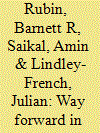

|
|
|
|
|
| Publication |
2009.
|
| Summary/Abstract |
The situation in Afghanistan has turned so far against the United States, NATO, the international community, and those Afghans who originally hoped that the post-11 September 2001 intervention would finally bring them a chance for normal lives, that it will be very difficult to salvage. Al-Qaeda has established a new safe haven in the Federally Administered Tribal Areas of Pakistan, from which it supports insurgencies in Afghanistan and Pakistan and continues its global planning against the United States and its allies. Its press releases are so frequent that they are hardly newsworthy unless they feature video of Osama bin Laden himself. Negative trends in Afghanistan include the deterioration of security, Afghan governance and regional stability. The stability of Pakistan, a nuclear-weapons state that has been the main source of proliferation over the past two decades, is now at serious risk. Rising India-Pakistan tensions further exacerbate the regional risk, as do tensions over Iran's nuclear programme and its relations with Hizbullah and Hamas.
The task in Afghanistan would have been difficult under any circumstances. The Bush administration's unique record of incompetence, fecklessness and criminality has assured that the Obama administration inherits its responsibilities under the worst possible circumstances, not only in the region, but globally as well. Still, as President Obama's chief of staff Rahm Emanuel said of the economic situation, 'You never want a serious crisis to go to waste'.
This serious crisis may finally force equally serious thinking about the goals of the international intervention in Afghanistan and the means required to have any serious hope of attaining or approaching them. Rather than proclaim objectives limited only by the audacity of our imaginations (an Islamic democratic, stable, gender-sensitive and prosperous Afghanistan) and the paucity of our means (fewer resources per capita than any other such operation), we need to align objectives with reality, and means with objectives.
|
|
|
|
|
|
|
|
|
|
|
|
|
|
|
|
|
|
|
|
|